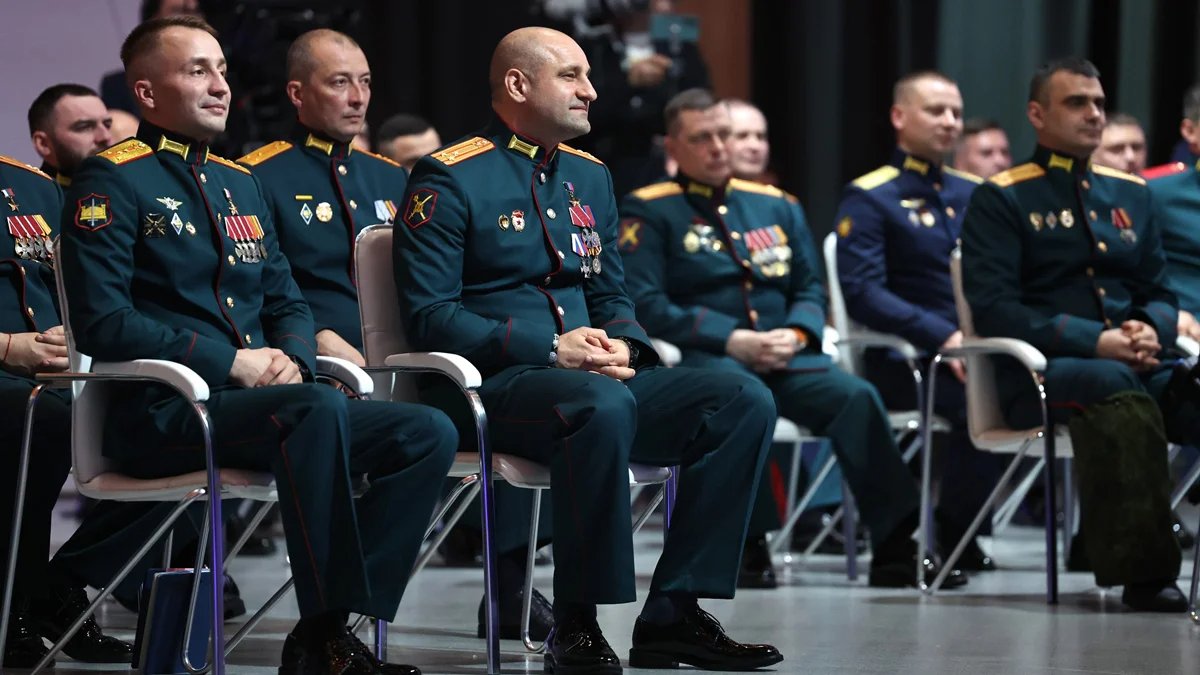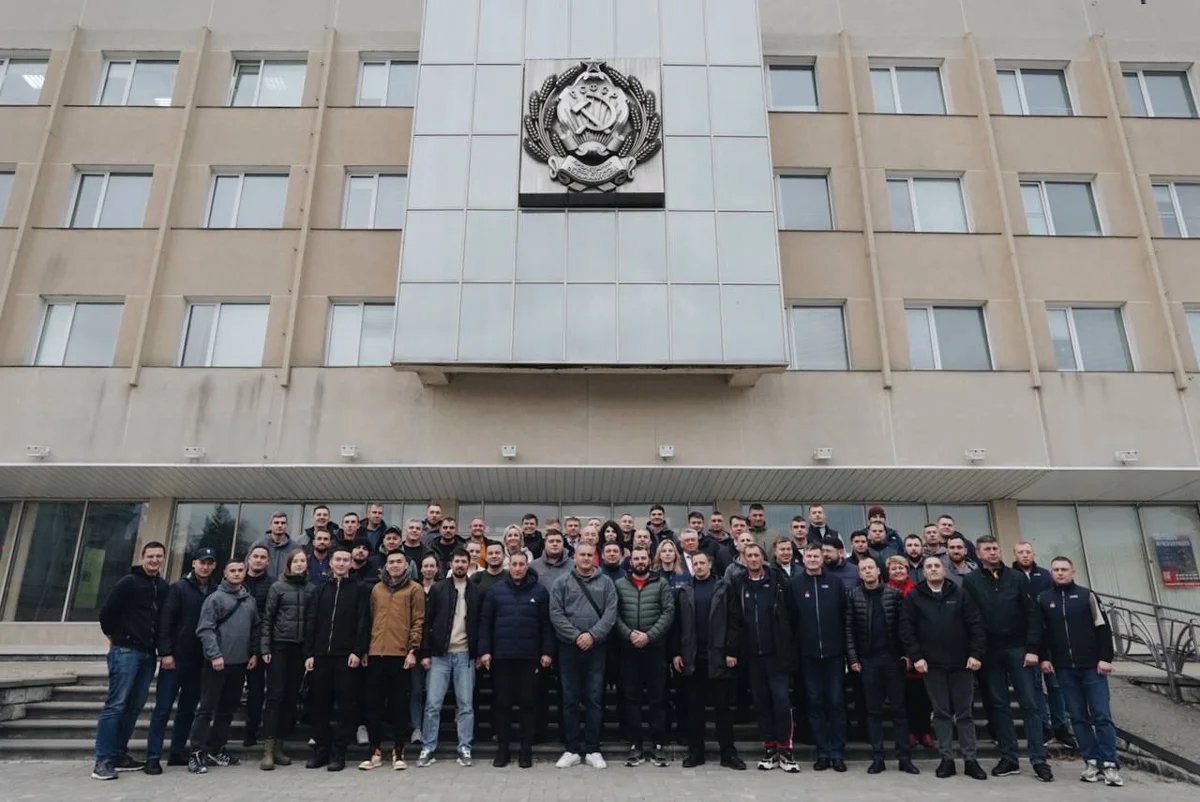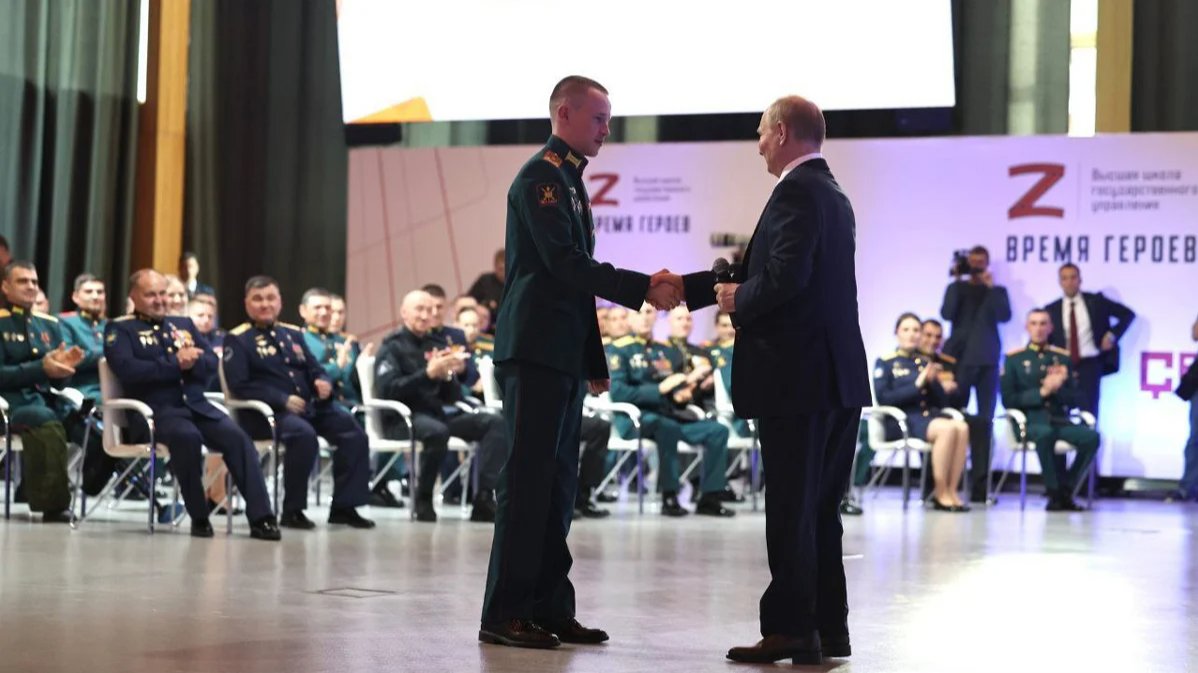Earlier this year, the Kremlin launched A Time of Heroes, a programme aimed at offering career advancement to a new Russian elite made up of Ukraine war veterans stringently selected for their loyalty and suitability for high office.
While any veteran or current serviceman in Russia’s “special military operation” in Ukraine is eligible to apply for the scheme as long as they are a Russian citizen, have completed higher education, have some management experience and no criminal record, the elite nature of the scheme is reflected in the fact that of the 44,000 applicants, just 83 were selected, or 0.1% of all candidates.
In a speech he gave about the programme, Vladimir Putin described those he wanted to see in the ranks of the “new elite” as “courageous” though “not necessarily young people”, adding that not only professional soldiers would be welcome to apply, but also those who enlisted to serve in the Russian military voluntarily as well as those from civilian professions who were called up in September 2022’s partial mobilisation of Russia’s military reserve.
The selected 83 candidates will be enrolled in a bespoke master’s programme at the Senezh special forces training centre outside Moscow, after which they will be given internships at state institutions and state-owned companies.
Finalists are enrolled in a specially designed master’s programme at the Senezh training centre and sent on internships to government agencies and state-owned companies. Upon completion of their internships, each candidate is guaranteed a job in the state apparatus.
Novaya Gazeta Europe was able to establish the identity of 80 of the 83 so-called “heroes”, and found that 13 of them are suspected of involvement in war crimes by the Ukrainian authorities. Several others on the programme are known to have been involved in battles for Ukrainian towns that were later completely destroyed, or to have served in divisions which, according to Kyiv, used violence against civilians or executed prisoners of war.
A new elite?
The initial intake of the Time of Heroes programme includes at least 18 individuals with extensive prior experience in government bodies, legislative bodies or non-military security agencies, or some 20% of all programme participants.
However, some of these 18 did not serve in the Russian military in Ukraine, or spent less than a year on the front line, as far as can be judged from media reports around the scheme. For example, Yevgeny Pevyshov, who is currently the governor of the Tambov region, served for just 8 months in the Cascade Combat Army Reserve unit, which Telegram channel VChK-OGPU called a “crony” unit, as it apparently consists mainly of officials and their sons who “serve” in the rear.
Another example is Abdullah Magomedov, a member of Dagestan’s legislative assembly for the ruling United Russia party. While he claimed to have enlisted to serve in Ukraine in late 2022, he has never given any specifics of his service and appears to have undergone training with the Akhmat battalion, which some military correspondents refer to as the “TikTok troops” due to their studied avoidance of combat operations.

Participants in A Time of Heroes meet with Vladimir Putin, 14 June 2024. Photo: Kremlin.ru
The military career of Alexander Sapozhnikov, a former vice-speaker of the legislative assembly in the Russian Zabaykalsky region and a former mayor of the city of Chita, is also notable, voluntarily enlisting to serve in Ukraine in late 2022. According to his own accounts, most of the soldiers serving alongside him were mobilised reservists from the Zabaykalsky region and elsewhere in the Russian Far East.
While in general mobilised soldiers remain on the frontline until the fighting ends, Sapozhnikov returned to Chita after just six months, according to his own media statements. Since his brief stint of military service, Sapozhnikov has completed two internships: one with Dmitry Kobylkin, who chairs the State Duma Committee on Ecology, and another in the government of the Yamalo-Nenets autonomous district in the Russian Arctic.
“It would be logical to show that an ordinary person can join the military and later become someone very important. Cases like these would get wide coverage in the media, but they simply don’t exist.”
However, about 78% of those offered places in the programme do have a professional military background. Many have experience in several recent armed conflicts, including the Chechen wars and operations in Kosovo, Syria and Nagorno-Karabakh. Most of the finalists have received military awards of various levels. At least 20 had been made Heroes of Russia, the country’s highest honorary award, before joining the programme, and two others were given the award after training began.
What the programme lacks entirely are those from civilian professions who enlisted in the Russian military to fight in Ukraine and were able to use their military experience as a springboard to enter politics, with the exception of those who previously held government positions.
“It would be logical to show that an ordinary person can join the military and later become someone very important. Cases like these would get wide coverage in the media, but they simply don’t exist,” says Alexey Gilev from St. Petersburg’s Andrew Gagarin Centre for Civil Society and Human Rights, who described Time of Heroes as “a symbolic bureaucratic decision that doesn’t actually address the problem, but rather exists for the sake of appearances.”

Participants in A Time of Heroes, October 2024. Photo: @vremyageroev2024 / Telegram
According to a source from the Presidential Administration who spoke to Novaya Europe on condition of anonymity, the main purpose of the programme is “to show that going to fight in the war is also a potential pathway to securing a prominent position in a government agency at a later date.”
Since the start of the programme, 23 participants have already been given appointments, two others have been elected to regional legislatures, while the head of the programme, Maria Kostyuk, has been appointed the acting governor of the Jewish autonomous region in Russia’s Far East.
“For bureaucrats, it would be more of a burden to accommodate veterans from the frontlines and assign positions to people with different, unsuitable experience.”
“An appointment might confer status, but in reality it doesn’t come with substantial power,” says Alexey Gilev. “For now, it seems the bureaucracy is reluctant to accept newcomers, so the programme has been turned into a symbolic means of encouragement for those who served in the war.”
Gilev also points out that military involvement in politics is not a new phenomenon in modern Russia. Following the collapse of the USSR, in the absence of a strong party system, a military career often served as a valuable reputational asset for candidates, helping them secure elections as deputies and governors. Several high-ranking military officials ran in the 1991 presidential elections, while General Lebed even came third in the 1996 Russian presidential election.
But the key difference today is that Russia no longer faces a shortage of management personnel. “For bureaucrats, it would be more of a burden to accommodate veterans from the frontlines and assign positions to people with different, unsuitable experience,” Gilev says, adding that Russia has a high “tolerance for patronage,” which allows officials to bring in those that they already know and with whom they are comfortable working. “Ordinary soldiers from the Time of Heroes programme are unlikely to have connections that can help them land those sorts of positions in state agencies,” Gilev concludes.

